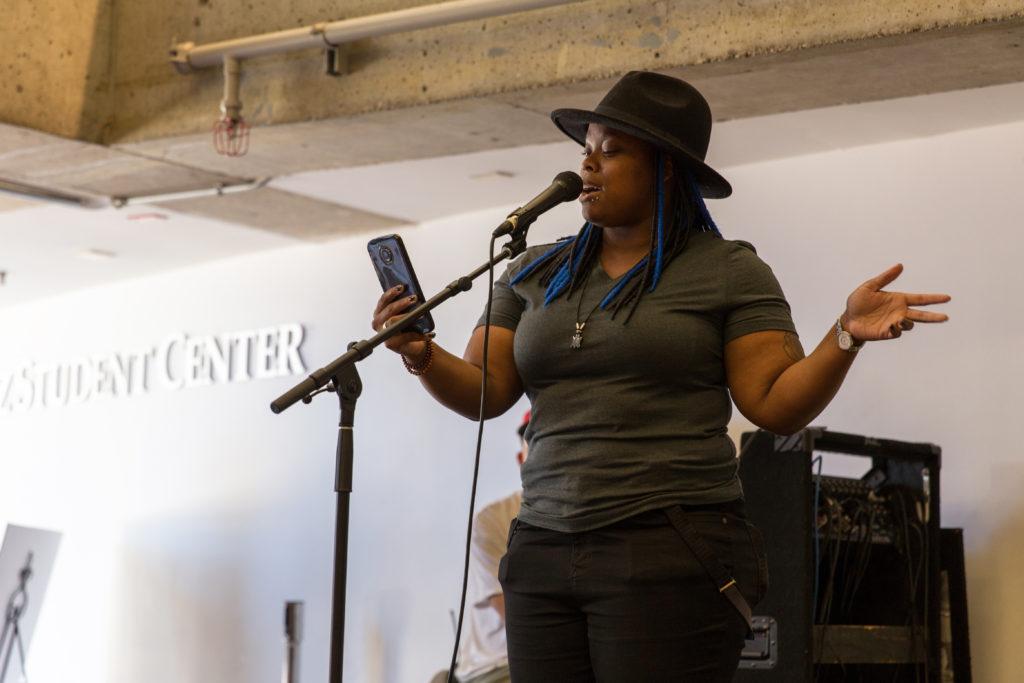Powerful texts that were forbidden to be taught and read in different educational institutions, including correctional facilities, were revisited by students and professors alike during Banned Book Week.
The Richard Oakes Multicultural Center put on the Banned Book Week event that took place in the lobby of the Cesar Chavez Center on Sept. 28th.
The ROMC promotes a multi ethnic, culturally conscious university that affirms the human and intellectual heritage of all people. The center encourages and welcomes all members of the University.
Spoken texts throughout the durations of readings brought up controversial concepts and ideas that were labeled inaccessible to students and were removed from the shelves altogether.

“It’s important to inform others about what these books have to offer,” Autumn Johnson, Office Advisor of the ROMC, said. “Even inmates in jail aren’t allowed to read some of these books we have here today, and I personally believe that is a violation of free speech.”
Books by authors like Angela Y. Davis, Luis Valdez, Thomas King and Toni Morrison were spread out along the table where students could choose passages or poems and read them aloud on stage. Each reader was then given a poster of their choice that was made by Sen, another valued member of the ROMC.
“I didn’t really know how the event was going to be set up, but the first passage I saw truly spoke to me and I knew that it was the one. I think when you look at these books, you have to realize there are a lot of themes that would get these texts banned,” Marque Greene, a Broadcast and Electronic Communications major, said. “They’re speaking against oppression, about the Prison Industrial Complex, and it’s interesting to me that those books would be banned in prison. We have these people perpetually trapped in the system and they don’t want inmates to be opening up their minds beyond the walls they’re trapped in.”
Along with intense poetry readings, the event also had displays of zines, which are self-published works, including pictures, short books, and websites. Zines mostly deal with material that can be too controversial for mainstream media, and consist of unusual designs and layouts.
“I realized that I had been making zines my whole life, but actually got serious with them about four years ago,” said author Jess Wu, who had her zines on display at the event. “It’s a more informal way to bring attention to real formal issues and a lot of my work talks about today’s politics and issues revolving around our LGBT community.”
Joining the event was also well-known poet and artist Sierra Greene, who spoke passionately about her experiences growing up as an African-American woman in the suburbs. She is excited to announce having a published book called “This Buoyant Body” in January of next year.
“What will you do when they take my body, and make carcass of it? A decaying thing with no longer a fast mouth and loud skin; I was a dead girl before you birthed me into this world, you gave birth to a body that was dead and now, I am being hunted down by white pigs in blue suits …” said Greene, in her first poetry reading.
The amount of emotion being produced from each reader expanded the room, moving students in the audience while shivers crept up and down their spines as they incited fingers to snap and voices to holler. People lining up on the railways of each floor produced a scene similar to animals hanging from the canopies in a rain forest, listening to the poets as if they were the dominant creatures of the pack.
Bay Area resident, Tianna Bratcher, read aloud a scene from Beloved, by Toni Morrison: “In the nature of my motherhood would not allow these things to consume me. Swallow you and drown you in the pits of their savagery, this was not an act of savagery, but an act of selfish love. And I, not knowing ever what it felt like to be loved in my entirety I did only what my being permitted.”
Bratcher said, “not just this poem, but this whole book, has inspired me to write my own collection of poems and short stories.”







